英语倒装句(最全面-最简洁)23110
- 格式:pptx
- 大小:704.03 KB
- 文档页数:51
![高中英语语法总结大全之倒装[大全]](https://uimg.taocdn.com/be3eb83a7dd184254b35eefdc8d376eeaeaa170f.webp)
高中英语语法总结大全之倒装[大全]第一篇:高中英语语法总结大全之倒装[大全]高中英语语法总结大全之倒装倒装句之全部倒装全部倒装是只将句子中的谓语动词全部置于主语之前。
此结构通常只用与一般现在时和一般过去时。
常见的结构有:1)here, there, now, then, thus等副词置于句首, 谓语动词常用be, come, go, lie, run。
There goes the bell.Then came the chairman.Here is your letter.2)表示运动方向的副词或地点状语置于句首,谓语表示运动的动词。
Out rushed a missile from under the bomber.Ahead sat an old woman.注意:上述全部倒装的句型结构的主语必须是名词,如果主语是人称代词则不能完全倒装。
Here he comes.Away they went.倒装句之部分倒装部分倒装是指将谓语的一部分如助动词或情态倒装至主语之前。
如果句中的谓语没有助动词或情态动词,则需添加助动词do, does或did,并将其置于主语之前。
1)句首为否定或半否定的词语,如no, not, never, seldom, little, hardly, at no time, in no way, not until… 等。
Never have I seen such a performance.Nowhere will you find the answer to this question.Not until the child fell asleep did the mother leave the room.当Not until引出主从复合句,主句倒装,从句不倒装。
注意:如否定词不在句首不倒装。
I have never seen such a performance.The mother didn't leave the room until the child fell asleep.典型例题1)Why can't I smoke here?更多资料请进入学习资源库我们期待您的加入At no time___ in the meeting-roomA.is smoking permittedB.smoking is permittedC.smoking is it permittedD.does smoking permit答案A.这是一个倒装问题。
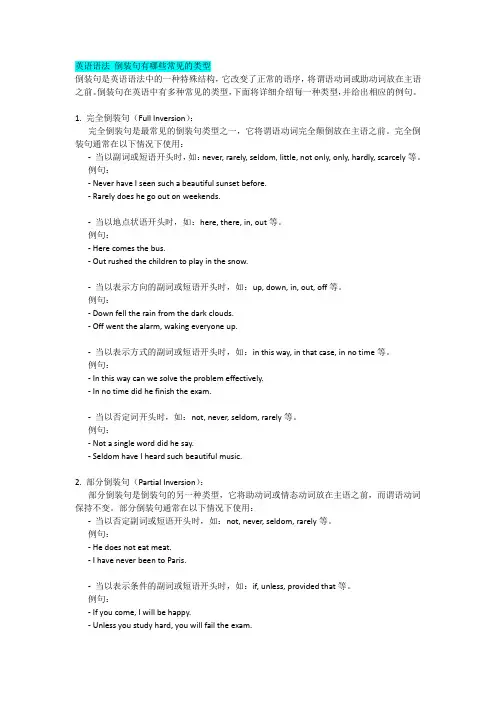
英语语法倒装句有哪些常见的类型倒装句是英语语法中的一种特殊结构,它改变了正常的语序,将谓语动词或助动词放在主语之前。
倒装句在英语中有多种常见的类型,下面将详细介绍每一种类型,并给出相应的例句。
1. 完全倒装句(Full Inversion):完全倒装句是最常见的倒装句类型之一,它将谓语动词完全颠倒放在主语之前。
完全倒装句通常在以下情况下使用:-当以副词或短语开头时,如:never, rarely, seldom, little, not only, only, hardly, scarcely等。
例句:- Never have I seen such a beautiful sunset before.- Rarely does he go out on weekends.-当以地点状语开头时,如:here, there, in, out等。
例句:- Here comes the bus.- Out rushed the children to play in the snow.-当以表示方向的副词或短语开头时,如:up, down, in, out, off等。
例句:- Down fell the rain from the dark clouds.- Off went the alarm, waking everyone up.-当以表示方式的副词或短语开头时,如:in this way, in that case, in no time等。
例句:- In this way can we solve the problem effectively.- In no time did he finish the exam.-当以否定词开头时,如:not, never, seldom, rarely等。
例句:- Not a single word did he say.- Seldom have I heard such beautiful music.2. 部分倒装句(Partial Inversion):部分倒装句是倒装句的另一种类型,它将助动词或情态动词放在主语之前,而谓语动词保持不变。
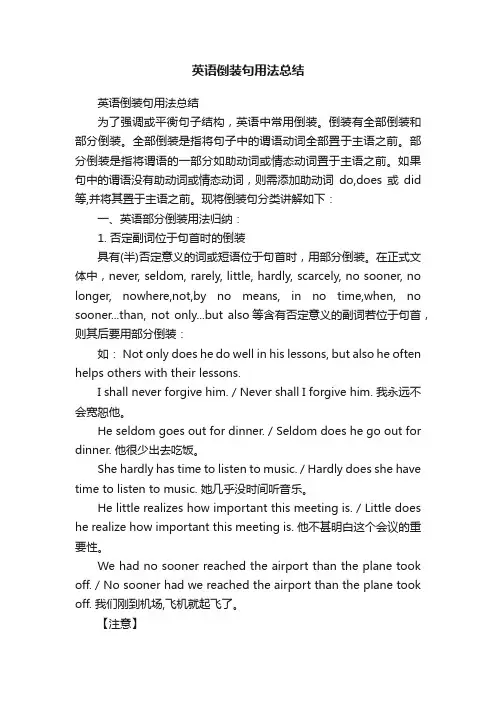
英语倒装句用法总结英语倒装句用法总结为了强调或平衡句子结构,英语中常用倒装。
倒装有全部倒装和部分倒装。
全部倒装是指将句子中的谓语动词全部置于主语之前。
部分倒装是指将谓语的一部分如助动词或情态动词置于主语之前。
如果句中的谓语没有助动词或情态动词,则需添加助动词do,does或did 等,并将其置于主语之前。
现将倒装句分类讲解如下:一、英语部分倒装用法归纳:1. 否定副词位于句首时的倒装具有(半)否定意义的词或短语位于句首时,用部分倒装。
在正式文体中,never, seldom, rarely, little, hardly, scarcely, no sooner, no longer, nowhere,not,by no means, in no time,when, no sooner...than, not only...but also等含有否定意义的副词若位于句首,则其后要用部分倒装:如: Not only does he do well in his lessons, but also he often helps others with their lessons.I shall never forgive him. / Never shall I forgive him. 我永远不会宽恕他。
He seldom goes out for dinner. / Seldom does he go out for dinner. 他很少出去吃饭。
She hardly has time to listen to music. / Hardly does she have time to listen to music. 她几乎没时间听音乐。
He little realizes how important this meeting is. / Little does he realize how important this meeting is. 他不甚明白这个会议的重要性。
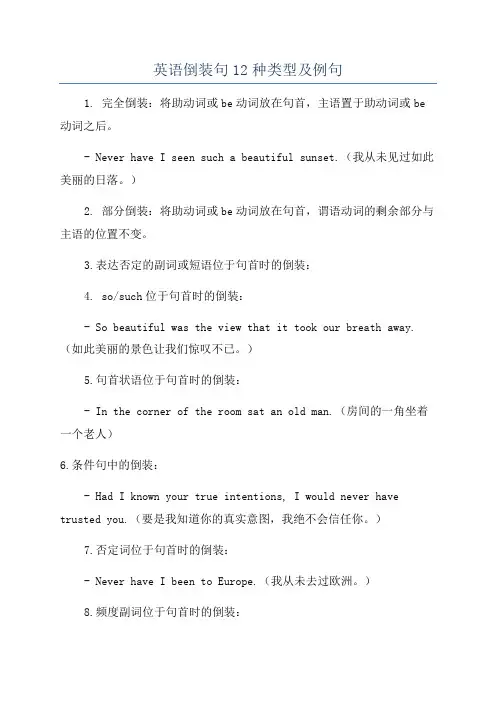
英语倒装句12种类型及例句1. 完全倒装:将助动词或be动词放在句首,主语置于助动词或be 动词之后。
- Never have I seen such a beautiful sunset.(我从未见过如此美丽的日落。
)2. 部分倒装:将助动词或be动词放在句首,谓语动词的剩余部分与主语的位置不变。
3.表达否定的副词或短语位于句首时的倒装:4. so/such位于句首时的倒装:- So beautiful was the view that it took our breath away.(如此美丽的景色让我们惊叹不已。
)5.句首状语位于句首时的倒装:- In the corner of the room sat an old man.(房间的一角坐着一个老人)6.条件句中的倒装:- Had I known your true intentions, I would never have trusted you.(要是我知道你的真实意图,我绝不会信任你。
)7.否定词位于句首时的倒装:- Never have I been to Europe.(我从未去过欧洲。
)8.频度副词位于句首时的倒装:- Rarely do we see such dedication.(我们很少见到如此的奉献精神。
)9.祈使句或祈使句部分的倒装:- Stand up!(站起来!)- Be quiet, please.(请安静。
)10. only位于句首时的倒装:- Only by working hard can you achieve your goals.(只有通过努力工作,你才能实现目标。
)11.地点状语置于句首时的倒装:- In the garden were beautiful flowers.(花园里有美丽的花朵。
)12.宾语置于句首时的倒装:- A love like this I have never felt before.(我之前从未感受过如此的爱。
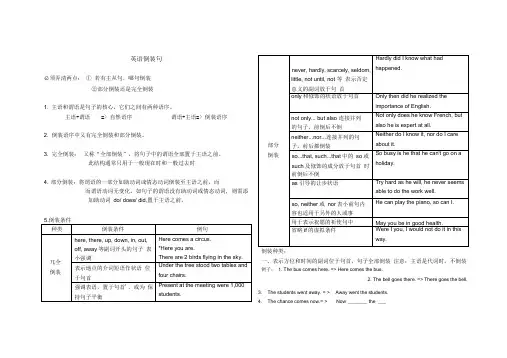
英语倒装句必须弄清两点:① 若有主从句,哪句倒装②部分倒装还是完全倒装1. 主语和谓语是句子的核心,它们之间有两种语序。
主语+谓语=> 自然语序谓语+主语=> 倒装语序2. 倒装语序中又有完全倒装和部分倒装。
3. 完全倒装:又称“全部倒装”,将句子中的谓语全部置于主语之前。
此结构通常只用于一般现在时和一般过去时4. 部分倒装:将谓语的一部分如助动词或情态动词倒装至主语之前,而而谓语动词无变化。
如句子的谓语没有助动词或情态动词, 则需添加助动词do/ does/ did,置于主语之前。
倒装种类:一、表示方位和时间的副词位于句首,句子全部倒装注意:主语是代词时,不倒装例子:1. The bus comes here. => Here comes the bus.2. The bell goes there. => There goes the bell.3. The students went away. = > Away went the students.4. The chance comes now.= > Now _______ the ___5. He rushed out. => Out __ .6. He comes here. => There二、以介词短语表示的状语,提前位于句首,全部倒装。
例子1. A tower stands in front of our school.=> In front of our school stands a tower.2. A temple stands at the top of the mountain.=> the top of mountain stands .3. Christmas trees, flowers and toys are among the goods.=> the goods Christmas trees, flowers and toys.三、表语位于句首,倒装结构表语+系动词+主语A. 形容词+系动词+主语Professor White and many other guests were present at the meeting.=> Present at the meeting were Professor White and many other guests.B. 过去分词+系动词+主语The days when they could do are gone.=> Gone are the days when they could do.四、将so/ neither/ nor放在开头,表示"••也(不)…",部分倒装注意:表示确实是这样”不倒装1. He went to the film last night. So did I.2. You must finish your work, so I.3. She is interested in the story, so I.4. He didn ' turn up. Neither his brother.*5. His mother told him not to go to the film. So he did.五、在if条件句,通常可以省略if,而将从句倒装条件:在if条件句,必须含有系动词were,助动词had情态动词should1. If he were younger, he would learn skating.Were he younger, he would learn skating.2. If they should forget to bring a map with them, they would get lost in the woods. they forgetto bring a map with them, they would get lost in woods.3. If they had realize how important the task was, they wouldn ' have refused to accept.=> they how important the task was, they wouldn ' have refused to accept.4. If I were you, I would help her.=> I you, I would help her.六、否定词或半否定词位于句首,部分倒装never/ little/ seldom/ not/ nowhere/ scarcely/ few/by no means(决不)/ at no time(从不)1. I have never been there. => Never have I been there.2. I knew little about it. => Little did I know about it.3. She seldom came late to school =>did she late to school.4. You should buy that kind of car by no means.should you that kind of car.七、以not until/ no sooner ••- than(一••就)/hardly ••- when(刚…就)/所引导的状语放在句首,部分倒装1. She didn't realize that she had lost her necklace until she got home.She realized that she had lost her necklace when she got home.=> Not until she got home did she realize that she had lost her necklace.直到她到了家才发现她丢了项链。
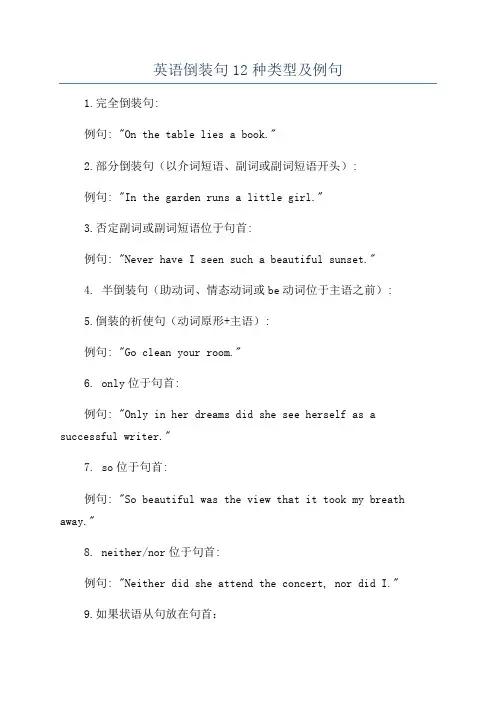
英语倒装句12种类型及例句1.完全倒装句:例句: "On the table lies a book."2.部分倒装句(以介词短语、副词或副词短语开头):例句: "In the garden runs a little girl."3.否定副词或副词短语位于句首:例句: "Never have I seen such a beautiful sunset."4. 半倒装句(助动词、情态动词或be动词位于主语之前):5.倒装的祈使句(动词原形+主语):例句: "Go clean your room."6. only位于句首:例句: "Only in her dreams did she see herself as a successful writer."7. so位于句首:例句: "So beautiful was the view that it took my breath away."8. neither/nor位于句首:例句: "Neither did she attend the concert, nor did I."9.如果状语从句放在句首:10.条件从句位于句首:例句: "Should he fail the exam, he will have to retake the course."11.介词短语或副词短语位于句首:例句: "In the corner sat a small dog."12. or/ nor引导的短语或句子位于句首:。
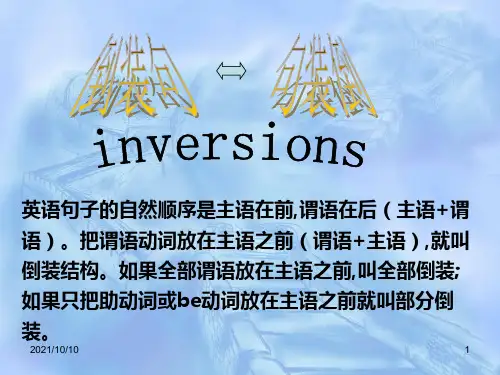
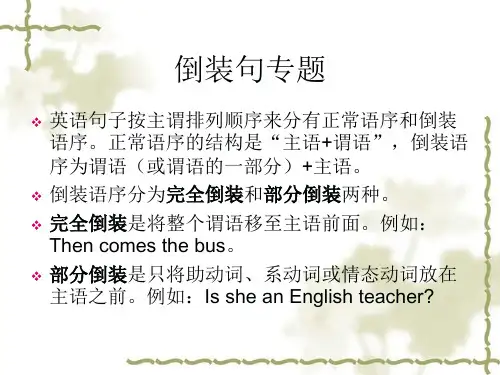

英语倒装句归纳 Share classic historical materials英语倒装句的用法类型1)部分倒装——助动词\情态动词+主语+谓语的实义动词型2)全倒装——谓语+主语型一、在以下结构中用全倒装:这种结构通常只用于一般现在时和一般过去时..常见的结构有:1.在there be或者There livestand;appear.seem;remain;exist…. 句型中;如:There are thousands of people on the square. 原语序:Thousands of people are there on the square.There lived an old fisherman in the village. 原语序:An old fisherman lived there in the village.There stands a little girl. 正常语序:A little girl stands there.2.在“here; there; now; thus; then+动词+主语”的句子中;谓语动词为be; go;come; lie; run等;主语为名词;Now comes my turn. There goes the bell. Then came the order to leave. Here comes a bus= A bus comes here.3.在“out\ in; up\ down; off\away;in the distance;on the hill;round the corner”等表示方向性的副词或表示地点的介词词组位于句首;且主语又是名词;谓语是表示运动的动词..Away went the crowed one by one. In came a stranger in black.Out rushed the children.. Down fell the leaves. On the floor were pilesof old books.☆注意:主语必须是名词eg: Out she went.There they are. Here he comes. 而Out went the girl. Here comes the boy.4.有时为了强调表语;构成“表语+连系动词+主语”结构;Lucky is she who was chosen to be a leader.=She who was chosen to be a leader is lucky.Gone are the days when women were looked down upon =The days when women were looked down upon are gone5、在某些表示愿望的祝愿语中;全倒装..Long live the People's Republic of China May you be happy二、在以下结构中用部分倒装部分倒装是指将谓语的一部分如助动词或情态倒装至主语之前..如果句中的谓语没有助动词或情态动词;则需添加助动词do; does或did;并将其置于主语之前..1.含有否定或半否定意义的词语如:not;never;seldom;hardly;little;scarcely;barely;few…;或者含有否定结构的连词not only…but also..; neither..nor..; no sooner had…than...一......就......; scarely..than..; Hardly had ...when..; not until...;nowhere等;或否定意义的介词词组by no means决不;in no case\way任何情况下都不;with no method; at no time决不; on no account决不;under no circumstances\condition...任何情况下都不位于句首eg: I have never seen him before.=Never have I seen him before.Not a word did he say when he left. Seldom/Scarecely does he go to that park.Hardly几乎不...... do I speak to him. Little English can he speak.Little does he realize the importance of the meeting. Few people did I see in the street.含有否定结构的连词:eg:1Not only can he play basketball; but also I can.2No sooner had we arrived home than it began to rain.3Hardly had we met our friends when the train left.4Not until the baby fell asleep did the mother leave the room.主句倒装;从句不倒装=The mother didn’t leave the room until the baby fell asleep.注意:1Not only...but also...必须连接两个分句时;才使用部分倒装..而且只倒装not only后的分句..如果连接的是两个并列词语;不用倒装结构..如:Not only his father but also I like reading.2Hardly...when...; Scarcely...than...; No sooner...than...意义基本相同;它们连接的句子;都只倒装前一个分句;即:“前倒后不倒装”..3当not until直到......才引导主从复合句时;主句倒装;从句不用倒装;或者可以理解为:“后倒前不倒装”..含有否定意义的介词词组:如:By no means should we tell lies. On no account should we let him leave.At no time决不will I get married to you. In Under no circumstances will I lend money to him.注意:in no time立即;马上位于句首时;其后无需用倒装语序:In no time he worked out the problem. 他马上就算出了那道题..2.only+副词;或介词短语;或状语从句时;主句倒装;eg: Only in this way can you use the computer well. only+介词短语Only yesterday did he find out that his watch was missing.only+副词Only when it began to rain did he finish his job.only+状语从句3.so用在句首;表示另一主语“也......样”时;用“So + behave;助动词或情态动词+主语”结构;而表示另一主语“也不......样”时;用“Nor\Neither + behave;助动词或情态动词+主语”结构;注意:若是对上文同一主语的情况进行强调时;不倒装..句型为“So+主语+be或dodid/have ”..He went to school yesterday; so did I.---David has made great progress recently. --So he has; and so have you.He hasn't finished his homework; and nor have I. 特别注意:If you won't go; neither/nor will I.4.as 作“尽管/虽然”;引导让步状语从句as可以换成though;由于语法需要;需要部分倒装..Shortest as/though she is; she is not the fattest.倒装后;最高级前不用冠词Child as he is; he knows a lot.倒装后;单数名词前不用aFail as I did; I would try again.倒装后;实义动词提前;在主语后添加助动词.. Hard as he tried; he didn't pass the exam.副词提到句首注意:though位于句首引导让步状语从句时;可以倒装;也可以不倒装..但as引导让步状语从句时;必须使用倒装..否则就变成了原因状语从句..eg:As he is too young; he couldn't go to school.5.在”so…that…”和”such…that…”引导的结果状语从句中;当so和such位于句首时;用”so\such + ... +部分谓语+ 主语+...”;So difficult was the exam that most of the students failed to pass it.=The exam was so difficult that most of the students failed to pass it.6.若if 引导的虚拟条件句中有were; had; should 时; 可将if省略;把were; had ; should 放在句首..1)Should it rain tomorrow; we would not play basketball.=If it should rain tomorrow; we would not play basketball.2Had I prepared well; I couldn't have lost the job.=If I had prepared well; I couldn't have lost the job.3 Were he to come tomorrow; I would go to meet him at the airport.=If he were to come tomorrow; I would go to meet him at the airport.倒装句练习题1. Not until I began to work ____ how much time I had wasted.A. didn't I realizeB. did I realizeC. I didn't realizeD. I realized2. Only by practising a few hours every day ____ be able to master the language.A. you canB. can youC. you willD. will you3. If you don't go; neither ____.A. shall I B. do I C. I do D. I shall4. No sooner ____ to the station ____ the train left.A. had I got; whenB. I had got; thanC. had I got; thanD. didI get; when5. — Your father is very strict with you. —_____ He never lets off a single mistake of ours.A. So he isB. So is heC. He is soD. So does he6. ____ today; he would get there by Sunday.A. Would he leaveB. Was he leavingC. Were he to leaveD. If he leave7. Never in my life ____ such a thing.A. I have heard or have seenB. have I heard or seenC. I have heard or seenD. did I hear or see8. —— Here ____ Where is Xiao LiuThere ____.A. comes the bus; is heB. comes the bus; he isC. the bus comes; is heD. the bus comes; he is9. ____ ;I will not buy it.A. Much as do I like itB. As much I like itC. Much as I like itD. As I like it much10. —— I like football. I don't like volleyball. ____.A. So do IB. Neither do IC. So it is with meD. So is it with me11. _____ the expense; I _____ to Italy.A. If it were not; goB. Were it not for\would goC. Weren't it for\will goD. If it hadn't been\would have gone12. So _____ in the darkness that he didn't dare to move an inch.A. he was frightenedB. was he frightenedC. frightened he wasD. frightened was he13. -- In modem times; girls like beautiful clothes.--Yes; _____ and_____ After all; our life has greatly improved.A. so do they; so do youB. so they do; so you doC. so do they; so you doD. so they do; so do you14. —— You have an English class every day except Sunday. _____.A. So we haveB. So we doC. So have weD. So do we15. I wonder if your wife will go to the ball. If your wife _____; so_____ mine.A. does; willB. will; doesC. will; wouldD. does; do16. Only after I read the text over again _____ its main idea.A. that I knewB. did I knewC. 1 could knowD. I did know17--You seem to have learned all the English words by heart. -- _____ .A. So l doB. So do lC. So I haveD. So have I18. -- I seldom watch TV; but listen to the radio a lot. --_____ .A. So do IB. Neither do IC. I m the sameD. So it is with me19. So excited _____ that he couldn't say a word.A. he seemedB. did he seemC. was he seemingD. he did look20. Jimmy was so nervous not a single word _____ down in the dictation.A. he wroteB. he was writtenC. did he writeD. was he written21. Little ______ when 1 took the trip where it would lead me.A. have I knownB. had I knownC. do 1 knowD. did I know22. -- Have you ever seen anything like that before---- ____.A. No; I never have seen anything like that beforeB. No; never I have seen anything like that beforeC. No; never have 1 seen anything like that beforeD. No; I have seen anything like that before never23. _____ ;1 would accept the invitation and go to the party.A. Were I youB. Was I youC. Had I been youD. Would 1 be you24. You should work less _____.A. and neither should IB. and so should IC. and nor should ID. and so I should25. _____ and caught the mouse.A. Up the cat jumpedB. The cat up jumpedC. Up jumped the catD. Jumped up the cat26. Not only _____ a promise; but also he kept it.A. did he makeB. he madeC. does he makeD. has he made27. His uncle is a worker and has been working in the factory for more than ten years. _____.A. So is his auntB. So has his auntC. So his aunt doesD. Soit is with his aunt28. Not once _____ their plan.A. did they changeB. they changedC. changed theyD. they did change29. -- Do you know Jim quarreled with his brother-- I don't know; and______ .A. nor don't I careB. nor do I careC. I don't care neitherD. Idon't care also30. Not until he arrived home _____ he find that this wallet had been stolen.A. didB. wouldC. whenD. that31. --This is one of the oldest trees in the world. _____ such a big tree.A. Never I have seenB. I haven't never seenC. Never have I seenD. I have seen never32. Nowhere else in the world _____ cheaper tailoring裁缝业;成衣业thanin Hong Kong.A. a tourist can findB. can a tourist findC. a tourist will findD.a tourist has found33._____ succeed in doing anything.A. Only by working hard we canB. By only working hard we canC. Only we can by working hardD. Only by working hard can we34._____ that we all went out; lying in the sun.A. So fine was the weatherB. So was the fine weatherC. The weather was so fine wasD. So the weather was tine35. ____ a nice man ____ that we all believe him.A. So; did he seemB. So; he seemedC. Such; he seemedD. Such; did he seem36. --You seem to be an actor. --___ . I have played many parts in alot of films.A. So do IB. So am IC. So I doD. So I am37. Not only ____ working hard; but also ____ very polite.A. the boy is; he isB. is the boy; he isC. the boy is; is heD. is the boy; is he38. ____; he never seems able to do the work beautifully.A. Try as he doesB. As he triesC. Try as does heD. As try he does39.-- I cannot see the picture well from here.---- _____.A. Neither can t IB. Neither I canC. I can't neitherD.Neither can I40.--You ought to have given them some advice ---- _____; but who cared what I askedA. So ought youB. So 1 oughtC. So it wasD. So I did41. So carelessly _____ that he almost killed himself.A. he drivesB. does he driveC. did he driveD. he drove42. Little _____ about his own health though he was very ill.A. he caredB. did he careC. he caresD. does he care43. Well ____ know him and well ____ know me.A. I did; he didB. did I; he didC. did I; did heD. I did; did he44. No sooner ____ they rushed out into the street.A. did they hear the news thanB. did they hear the news whenC. had they heard the news thanD. had they heard the news when45. Little wonder _____ up their hands in dismay.A. have some thrownB. some have thrownC. thrown some haveD. have thrown some46. ____; he would have passed the exam. A. If he were to studyB. If he studied hardC. Had he studied hardD. Should he study hard47. We were lucky enough; for no sooner _____ home _____ it rained.A. we returned; andB. we had returned; whenC. did we return; whenD. had we returned; than48. So little _____ agree on the plan that they could not settle their difference.A. did theyB. do theyC. they didD. they did not49. _____ he realized it was too late to return home.A. No sooner it grew dark thanB. Hardly did it grow dark whenC. It was not until dark thatD. It was until dark that参考答案1~5 BDACA 6~10 CBBCC 11~15 BDDBA 16~20 BADBC 21~25 DCABC 26~30 ADABA 31~35 CBDAD 36~40 DBADD 41~45 CBCCB 46~49 CDAC。
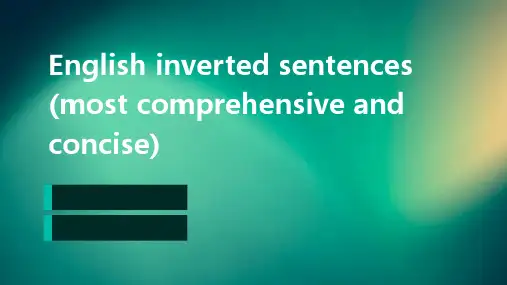

中小学英语倒装句3大类型例句,非常全,必须为孩子留一份!倒装句是中小学生在英语学习过程中应该重点掌握的句型之一。
英语句子的倒装,一般是根据语法结构或者修辞等方面的需要,而改变句子的语序,把主语之后的句子成分提到主语之前。
这类句子我们就称为“倒装句”。
倒装句主要是起一个强调的作用。
今天小编就和大家分享一下英语倒装句3大类型及例句,希望能够帮助同学们更好的掌握倒装句!英语倒装句3大类型及例句,更多学习资料关注:呼市学习帮类型一、半倒装句式1、否定词/短语/句型位于句首,必须进行半倒装。
⑴常见否定词:no, not, little, few, never, seldom, rarely, nothing, nobody, none写人文章:I will never forget the time that I spent with him/ her. → Never will I forget …记事文章:I will never forget this u nforgettable experience.→ Never will …⑵否定短语:短语本身表示否定含义in no wayby no meanson no accountunder no circumstancesin no conditions例如 By no means can students use cellphone in the class.in no time 立刻2、否定句型⑴一…就…” no sooner … than …hardly … when … (一般用于过去时语境中)一…(过完) 就…(一过)例如小明一打开电脑,他妈妈就关掉电源。
Xiao Ming had hardly turned on the computer when his mother turned off the power. Hardly had Xiao Ming turned on …“一…就…” as soon ason/ upon the moment/ minute(连词用法) 一般现在时例如On arrival at the park, …On arr iving at the park, …On hearing,⑵not only … but also …① 主谓一致(就近原则)② also可省略③ not only … but … as well④ 如将not only放于句首,要倒装。
倒装句型知识点总结一、什么是倒装句型倒装句是指将句子中的谓语动词提前放置,主语放在动词之后的一种句型。
倒装句型分为部分倒装和全部倒装。
二、全部倒装1. 在以 here, there, out, in, off 等表示方向或位置的副词和介词短语开头的句子中,可用全部倒装的结构。
例句:Here comes the bus.译文:公共汽车来了。
2. 在以表示“否定”和“否定意义”的状语,即 never, seldom, little, in no way, not, rarely, scarcely, hardly 等副词开头的句子中,也可用全部倒装的结构。
例句:Seldom does he go to the cinema.译文:他很少去看电影。
3. 如果表示“地点的副词+助动词+主语”的句子,助动词提前,则采用全部倒装。
例句:On the wall hangs a picture.译文:墙上挂着一幅画。
4. 句首为否定副词或表否定意义的短语时,可用全部倒装的结构。
例句:Not until the war was over did he return home.译文:直到战争结束他才回家。
5. 表示“从句+主句”的倒装结构。
例句:However hard he worked, he could not pass the exam.译文:无论他多努力,他也没有通过考试。
三、部分倒装部分倒装是指在句首用助动词将主语与谓语的一部分倒装。
1. 在以 only, little, no sooner, hardly, scarcely 等副词开头的句子中,主、谓倒装。
例句:Only in this way can we succeed.译文:只有这样,我们才能成功。
2. 在以表示“基本上否定意义的频度词、程度副词或时间状语”如 seldom, never, not, hardly, nowhere, little, no more, at no time, by no means, in no way, in no circumstances, on no occasion, in no sense, under no conditions, under no circumstances, barely, seldom, little, rarely 等开头的句子中,主、谓倒装。
英语语法结构--倒装句倒装句是英语语法中的一种结构,指的是将句子中的主语和谓语的位置颠倒,即将谓语置于主语之前。
倒装句在英语中使用频率较高,常用于强调、表示条件、表示地点和时间等情况下。
以下是关于倒装句的详细介绍。
一、完全倒装句完全倒装句是指将整个谓语放在主语之前,常见的结构有:1."助动词/情态动词 + 主语 + 谓语" 例如:•Can you swim? (你会游泳吗?)•Will she come tomorrow? (她明天会来吗?)•Should we start now? (我们现在应该开始吗?)•Had I known the truth, I wouldn't have gone. (如果我知道真相,我就不会走了。
)2."状语 + 动词 + 主语" 例如:•In came the teacher. (老师走了进来。
)•Out rushed the students. (学生们冲了出去。
)•Up went the balloon. (气球飘了上去。
)•Down fell the rain. (雨下了下来。
)3."there be" 结构的倒装例如:•There is a book on the desk. (桌子上有一本书。
)•There are many people in the park. (公园里有很多人。
)•There was a loud noise outside. (外面传来一声巨响。
)•There will be a meeting next week. (下周将有一次会议。
)二、部分倒装句部分倒装句是指将谓语中的助动词或情态动词放在主语之前,常见的结构有:1."助动词/情态动词 + 主语 + 不完全动词" 例如:•Did you see the movie? (你看过那部电影吗?)•Does she like ice cream? (她喜欢冰淇淋吗?)•Can I borrow your pen? (我可以借你的笔吗?)•Should we go now? (我们现在应该走吗?)2."情态动词 + 主语 + 动词" 例如:•Can you swim? (你会游泳吗?)•Will she come tomorrow? (她明天会来吗?)•Must he finish the report today? (他必须今天完成报告吗?)•Should we start now? (我们现在应该开始吗?)3."副词 + 助动词/情态动词 + 主语 + 动词" 例如:•Never have I seen such a beautiful sunset. (我从未见过如此美丽的日落。
语法精讲:英语倒装句总结倒装的种类英语最基本的词序是主语在谓语动词的前面。
如果将句子的主语和谓语完全颠倒过来,这称之为完全倒装。
如果只将助动词或情态动词移至主语之前,谓语的其他部分仍保留在主语的后面,这称之为部分倒装。
一.完全倒装完全倒装是将谓语的全部放在主语之前,此结构通常只用于一般现在时和一般过去时两种。
On her left sat her husband.她左边坐着她丈夫。
Here is the book you want.你要的书在这儿。
Down went the small boat.小船沉下去了。
二.部分倒装部分倒装是指将谓语的一部分,如助动词或情态动词,移至主语之前。
Only by working hard can one succeed.只有努力才能成功。
Never have I seen her before.我以前没见过她。
提示:如果句中的谓语没有助动词或情态动词,则需添加助动词do,does或did,并将其置于主语之前。
Well do I remember the day I joined the League.入团的那一天,我记忆犹新。
Little did I think that he could be back alive.我没有想到他竟能活着回来。
三.常见的倒装结构A.常见的完全倒装结构1.there be句型。
There is a mobile phone and some books on the desk.桌上有一个手机和一些书。
There are thousands of people gathering on the square.广场上聚集着成千上万的人。
注意:引导词there还可以接appear,exist,lie,remain,seem,stand,live等词。
There lived an old fisherman in the village.村里住着一位老渔夫。